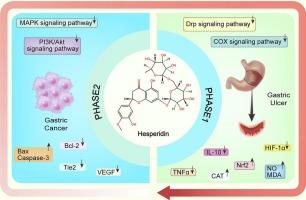橙皮苷阻断胃炎-胃癌级联:多途径调控及机制
IF 4
2区 农林科学
Q2 FOOD SCIENCE & TECHNOLOGY
引用次数: 0
摘要
胃癌是一种高度恶性的肿瘤,Correa's级联反应揭示了肠型胃癌的进展。开发多靶点药物是防治胃癌的关键。橙皮苷因其抗炎、抗氧化、抗血管生成等作用在胃癌防治中受到广泛关注。本研究通过多种信号通路探讨橙皮苷在胃癌发生发展中的调控机制。在慢性粘膜炎症中,橙皮苷作用于多种信号通路,包括Drp、ERK/Nrf2、IL-10、HIF-1α、TNF、COX和NF-κB。通过这些途径,控制幽门螺杆菌感染,抑制Cajal间质细胞线粒体自噬,减少氧化应激,从而减轻炎症,促进溃疡愈合。在胃癌中,橙皮苷通过调控MAPK、PI3K/Akt、Bcl-2、ANGPT-TIE信号通路诱导细胞凋亡、抑制细胞增殖、抑制血管生成。橙皮苷耐受性良好,在代谢和心血管疾病的临床试验中已显示出改善内皮功能、减少炎症和减轻氧化应激的作用。它保留了健康的肠道微生物群,并得到了完善的提取方法的支持,使其成为预防胃炎向胃癌发展的临床转化的有希望的候选者。本文章由计算机程序翻译,如有差异,请以英文原文为准。

Hesperidin blocks the gastritis-to-gastric cancer cascade: multi-pathway regulation and mechanism
Gastric cancer is a highly malignant tumor, and Correa's cascade reveals the progression of intestinal-type gastric cancer. Developing multi-targeted agents is key to gastric cancer prevention and treatment. Hesperidin has attracted considerable attention for its anti-inflammatory, antioxidant, and anti-angiogenic effects in gastric cancer prevention and treatment. This study investigates the regulatory mechanisms of Hesperidin in gastric cancer development by targeting multiple signaling pathways. In chronic mucosal inflammation, hesperidin targets multiple signaling pathways, including Drp, ERK/Nrf2, IL-10, HIF-1α, TNF, COX, and NF-κB. Through these pathways, it controls Helicobacter pylori infection, inhibits mitochondrial autophagy in Cajal interstitial cells, reduces oxidative stress, and thereby alleviates inflammation and promotes ulcer healing. In gastric cancer, hesperidin induces apoptosis, inhibits cell proliferation, and suppresses angiogenesis by regulating the MAPK, PI3K/Akt, Bcl-2, and ANGPT-TIE signaling pathways. Hesperidin is well-tolerated and has been shown to improve endothelial function, reduce inflammation, and alleviate oxidative stress in clinical trials of metabolic and cardiovascular diseases. It preserves a healthy gut microbiota and is supported by well-established extraction methods, making it a promising candidate for clinical translation in preventing the progression from gastritis to gastric cancer.
求助全文
通过发布文献求助,成功后即可免费获取论文全文。
去求助
来源期刊

Journal of Functional Foods
FOOD SCIENCE & TECHNOLOGY-
CiteScore
9.60
自引率
1.80%
发文量
428
审稿时长
76 days
期刊介绍:
Journal of Functional Foods continues with the same aims and scope, editorial team, submission system and rigorous peer review. We give authors the possibility to publish their top-quality papers in a well-established leading journal in the food and nutrition fields. The Journal will keep its rigorous criteria to screen high impact research addressing relevant scientific topics and performed by sound methodologies.
The Journal of Functional Foods aims to bring together the results of fundamental and applied research into healthy foods and biologically active food ingredients.
The Journal is centered in the specific area at the boundaries among food technology, nutrition and health welcoming papers having a good interdisciplinary approach. The Journal will cover the fields of plant bioactives; dietary fibre, probiotics; functional lipids; bioactive peptides; vitamins, minerals and botanicals and other dietary supplements. Nutritional and technological aspects related to the development of functional foods and beverages are of core interest to the journal. Experimental works dealing with food digestion, bioavailability of food bioactives and on the mechanisms by which foods and their components are able to modulate physiological parameters connected with disease prevention are of particular interest as well as those dealing with personalized nutrition and nutritional needs in pathological subjects.
 求助内容:
求助内容: 应助结果提醒方式:
应助结果提醒方式:


